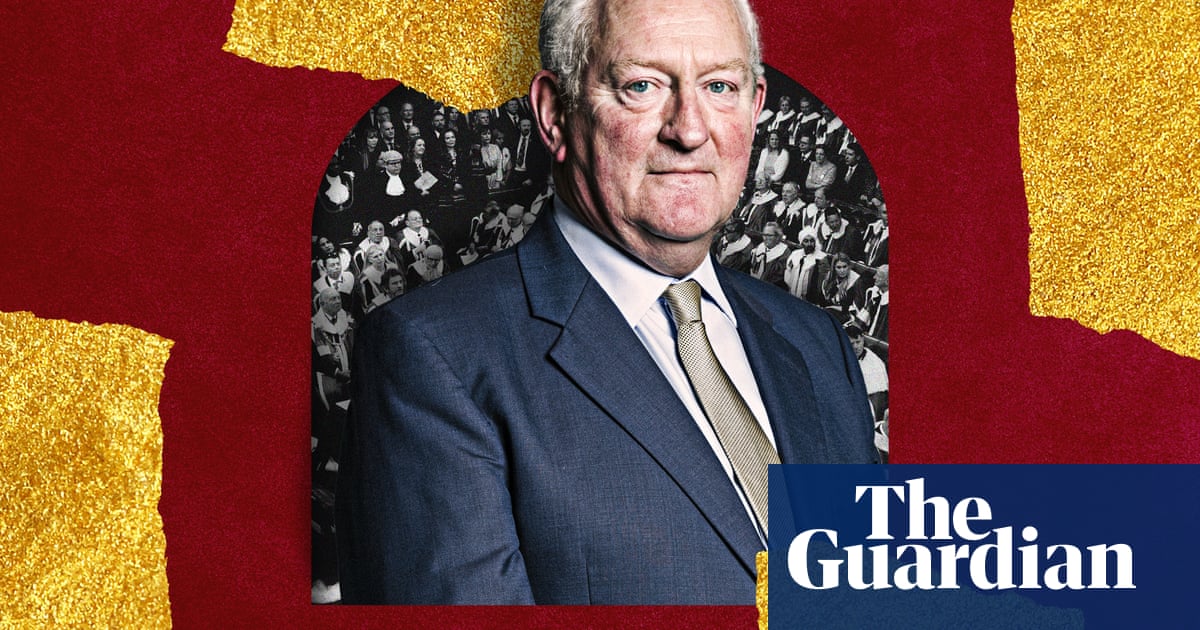A Conservative hereditary peer, who was previously punished for breaking theHouse of Lordsrules, is facing fresh questions over whether he breached them again after he admitted he “erroneously” made claims last year for travel expenses he did not incur.
After inquiries by the Guardian, the Earl of Shrewsbury said he has offered to reimburse the taxpayer for the travel expenses he claimed, and any sums that could be due from part of a first-class ticket he used to attend a board meeting of a commercial company.
The peer, whose full name is Charles Henry John Benedict Crofton Chetwynd Chetwynd-Talbot, wrote “in jest” in an email to his fellow directors that the “government pays” for his travel to the meeting.
Shrewsbury, 72, a member of the Lords since 1981, made the expenses claims shortly after returning to the upper chamber from a nine-month suspension, one of thebiggest punishments ever imposed on a peer.
He was banned in 2023 from the Lords after he was paid £57,000 over 19 months to lobby ministers and officials by a healthcare company in what wasjudged by the Lords’ watchdog to be a “lucrative relationship”.
The House of Lords committee in charge of monitoring the behaviour of peers ruledthat his misconduct was “extremely serious”and had damaged the reputation of the upper chamber.
Now leaked emails and documents obtained under freedom of information legislation raise questions about his adherence to strict rules governing peers’ use of the House of Lords expenses scheme, which covers travel only for parliamentary business.
He used the scheme to claim the cost of a rover ticket, which permitted him to travel first-class on the UK’s rail network for 14 days, on the basis that it was to be used solely for parliamentary work.
On 17 January last year, Shrewsbury used this rail ticket for part of his journeys to attend the board meeting of a property development company, Cheshire Land. He has been anon-executive director of this businessfor three years.
The day before the board meeting in Liverpool, a fellow director had emailed the peer to ask if he was intending to attend as there had been heavy snowfall.
The peer emailed back: “I am all set. Travelling up from London. Government pays! … the snow doesn’t daunt me – hundreds of years of inbreeding makes me of sterner stuff.”
The peer is in potential breach of the House of Lords’ rules, as he used this ticket for part of his journeys up to the company board meeting in Liverpool and then back to London on the same day – travel that was not part of his parliamentary work.
Shrewsbury’s House of Lords expenses claims, released after a freedom of information request, also show he claimed mileage for travel by car to and from his home in Derbyshire to the station in Stafford on three consecutive days around the time of the board meeting.
This includes four journeys he cannot have made as he was either in London or Liverpool. The claims totalled £54.
Shrewsbury said he had notified the House of Lords finance department that he had “erroneously claimed mileage for four journeys” and had used his taxpayer-funded rail ticket for part of his journeys to the board meeting.
Shrewsbury said: “Whether I was right or wrong, I have asked the finance department to take the amounts which they might believe to be due from both matters from my attendance allowance for April 2025.”
He added that he believed he had “acted in good faith”. He said that on his way to the board meeting in Liverpool, he had broken his train journey at Stafford where his wife had met him.
He said his wife had driven to Stafford from their home nearby to deliver to him his wallet and papers for the board meeting as he had inadvertently left them at home. He then continued his journey from Stafford to Liverpool, and back again, on a return rail ticket that he had bought out of his own pocket.
He said that his wife’s car journey was an “exceptional circumstance” and therefore permitted by the Lords’ expenses policy.
He said: “Fellow directors are fully aware of the fact that I am able to claim train travel costs from my designated station(s) to London in the course of my parliamentary duties, hence my comment that the government pay. They also know that I pay for my own travel by train when on the very odd occasion I travel to meetings in Liverpool from Stafford. My comment was made in jest.”
Shrewsbury said he uses 14-day first-class rover tickets for attending the House of Lords. He added that he was permitted to buy the ticket as it was cheaper than the equivalent number of fully flexible standard-class tickets, and said that beyond the trip last January, he had not used the ticket for non-House of Lords business. He said he needed to travel first-class due to his age and disabilities.
